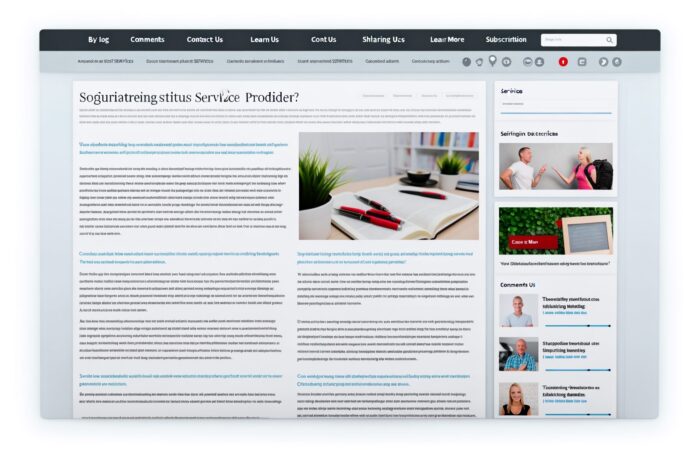Introduction to Content Research Tools
Whether you’re a seasoned content creator or a business owner just dipping your toes into the ocean of digital marketing, content research tools are your best friends. These are the trusty helpers that guide your content creation process, ensuring that what you produce is not only valuable and engaging but also competitive in today’s crowded digital space.
But first, let’s clarify what we mean by content research tools. These are software programs, platforms, or online resources designed to assist you in identifying the best topics, formats, and strategies for your content. They analyze various factors including trending topics, audience preferences, keyword popularity, and even your competitors’ content to give you a clear picture of what works and what doesn’t in your niche.
From a content marketing perspective, these tools are crucial for several reasons:
- Understanding your audience: These tools provide invaluable insights into what your potential customers are interested in, their concerns, and the type of content they engage with the most.
- Finding popular topics: They help identify what is currently trending in your industry, so you can create content that resonates with your audience.
- Optimizing for SEO: If you want your content to rank well on search engines (and who doesn’t?), these tools can help you find the best keywords and SEO strategies.
- Staying ahead of the competition: With the help of these tools, you can keep an eye on your competitors and stay updated on their content strategies.
The sheer number of content research tools available today can be overwhelming. But don’t worry, we’re here to guide you through this jungle. In our upcoming sections, we’ll discuss each type of tool in detail – from social media analysis and keyword research to competitor analysis and visual content research.
Whether you’re a blogger, a social media marketer, an SEO specialist, or a business owner managing your own content marketing, there’s a content research tool out there for you. And with the right selection, you’ll be well on your way to creating content that not only attracts and engages your audience but also drives traffic and conversions.
So, buckle up and get ready to dive into the exciting world of content research tools. It’s time to take your content to the next level!
Key Features to Look for in Content Research Tools
When it comes to curating engaging, quality content, research is your best friend. Effective content research tools can make a world of difference in your content creation process, saving you time, effort, and helping you land that sweet spot of relevance and originality. But, with a vast array of tools out there, what makes some stand out from the crowd? Let’s break down some of the key features to look for when choosing your content research tools.
User-friendly Interface
First things first, usability. It’s essential that your tool is easy to navigate and understand. Complex interfaces can slow you down and make your content research a nightmare. So, go for a tool that offers an intuitive, user-friendly interface. This way, you can focus more on creating than figuring out how to use the tool.
Comprehensive Data Collection
Next, let’s talk about data. A top-quality tool should provide comprehensive data collection. This includes the ability to gather and analyze data from multiple sources, such as social media, websites, and other online platforms. The more complete the data, the richer your content can be.
Trend Tracking Capabilities
In our fast-paced digital world, staying on top of the latest trends is a must. So, a key feature to look for in a content research tool is trend tracking. This functionality allows you to keep your finger on the pulse of what’s trending in your industry, ensuring your content is always relevant and fresh.
SEO Optimization Tools
Let’s not forget about SEO. A solid content research tool should include SEO optimization features. This means it should help you identify the right keywords, understand search intent, and provide suggestions on how to optimize your content for search engines – because what’s the point of creating great content if no one can find it, right?
Real-Time Analytics
Last but not least, real-time analytics. This feature enables you to monitor the performance of your content in real-time, providing insights that can help you refine your strategy. You can see what’s working, what’s not, and make the necessary adjustments to improve engagement and drive traffic.
There you have it! These are some of the key features to look for in a content research tool. Remember, the best tool is one that fits your specific needs and enhances your content production process. So, take some time to try out different options, and find the one that works best for you. Happy creating!
Top Tools for Social Media Trends and Analysis
Social media is a hub of exciting trends and insights, and to stay ahead, you need to have the right tools at your disposal. And you’re in luck because we’re about to share some of the best tools for social media trends and analysis. So grab a cup of coffee, and let’s dive in!
BuzzSumo
Ever wondered what content is making a buzz online? Well, BuzzSumo has you covered. This tool allows you to track content on social media and find the most shared or ‘buzzed’ about topics. You can even filter by location, language, or content type. It’s like having a personal content detective!
Sprout Social
Sprout Social is the Swiss Army knife of social media tools. Not only does it help you manage and schedule posts on different platforms, but it also offers robust analytics features. It helps you understand your audience better, track engagement, and monitor trends. In other words, it’s the secret ingredient to your social media success recipe.
Socialbakers
What if you could spy on your competitors’ social media strategies? Sounds fun, right? Socialbakers lets you do just that. It gives you insights on competitors’ performance, audience preferences, and trending content. It’s like having a bird’s eye view of your competitive landscape.
Hootsuite
Hootsuite is one of the most popular social media tools out there, and for a good reason. It offers everything from post scheduling to tracking conversations around specific topics. Plus, it provides detailed analytics to help you understand trends and improve your strategy. Hootsuite is like your personal social media assistant.
Keyhole
If you’re into hashtags (and who isn’t?), you’ll love Keyhole. This tool helps you track hashtags, keywords, and accounts across various social media platforms. It’s perfect for understanding hashtag trends and tracking campaign performance. Keyhole is your key to unlocking the power of hashtags.
Remember, these tools are not magic wands. They require you to input the right data and need some time to deliver valuable insights. But once you get the hang of them, they can be true game-changers for your social media strategy.
So go ahead, take these tools for a spin, and let the social media landscape become your playground. Be ready to ride the wave of trends and keep your brand at the forefront of the social media scene.
Essential Tools for Keyword Research and SEO Optimization
When it comes to SEO, keyword research is the bedrock upon which any successful strategy is built. It’s like a treasure hunt – you’re looking for those golden phrases which will connect your content with your audience. But without the right tools, this can feel like trying to find a needle in a haystack. That’s where we come in. We’ve curated a list of some of the most effective tools that can supercharge your SEO efforts. Let’s dive in!
Google Keyword Planner
First on our list is an oldie but a goodie – Google Keyword Planner. It’s a free tool developed by Google itself, and it offers a wealth of data straight from the horse’s mouth. You just enter a keyword, and voila, you get an estimate of search volume and competitiveness. You can also discover new keyword ideas related to your niche.
SEMrush
Next up is SEMrush. This is a comprehensive SEO tool that offers a lot more than just keyword research. With SEMrush, you can track keyword ranking, check backlinks, analyse competitor data, and much more. One of its standout features is the “Keyword Magic Tool”, which generates an extensive list of keyword suggestions for any given seed keyword. A real must-have for your SEO toolkit.
KWFinder
If you’re after a straightforward, user-friendly keyword research tool, then KWFinder could be your perfect match. This tool excels at finding long-tail keywords with low SEO difficulty. Plus, it provides a powerful Google SERP analysis feature, which allows you to scrutinise the top-ranking pages for any keyword.
Moz Keyword Explorer
Moz Keyword Explorer is another heavy hitter in the SEO world. It supplies keyword suggestions, SERP analysis, and a wealth of metrics like organic CTR and priority score. What sets it apart is its exceptional user interface and the quality of data it provides, making it a preferred choice for many SEO professionals.
Answer the Public
Last but not least, we have Answer the Public. This tool is particularly great for finding question-based keywords. It generates a plethora of queries that people are asking on a certain topic, providing you with a great source of content ideas that have the potential to drive organic traffic.
In summary, keyword research and SEO optimization don’t have to feel like a Herculean task. With these tools at your disposal, you’ll be well-equipped to craft an SEO strategy that drives results. Remember, the key to mastering SEO is to stay consistent, patient, and always be ready to adapt to the ever-changing search engine algorithms.
Unlocking Your Competitor’s Content Game Plan
Ever wondered what makes your competitors’ content strategy so effective? Believe it or not, there’s a science to it, and it’s all about having the right tools in your arsenal. So, let’s dive into the world of competitor content analysis and see how you can use it to your advantage.
What is Competitor Content Analysis?
Competitor content analysis is like having a backstage pass to your competitors’ content strategies. It allows you to scrutinize their most successful blog posts, eye-catching graphics, engaging social media updates, and much more. With the help of some top-tier tools, you can decode their strategy and use it to craft your own winning content game plan.
Top Tools for Competitor Content Analysis
- SpyFu: This tool gives you a comprehensive view of your competitors’ SEO practices. It shows you the keywords they rank for, their top-performing content, and even their backlinks. It’s like a treasure trove of SEO intelligence.
- BuzzSumo: BuzzSumo is a fantastic tool for analyzing what content performs best for any topic or competitor. It helps you see the type of content that’s trending in your industry and who’s getting the most social buzz.
- Social Blade: If you want to keep an eye on your competitors’ social media game, Social Blade is your tool. It lets you track user statistics for YouTube, Twitch, Instagram, and Twitter, giving you a clear picture of your competitors’ social media performance.
- Ahrefs: Known for its backlink analysis, Ahrefs is also great for competitor content analysis. It uncovers the most linked-to content in your niche, identifies your competitors’ top pages, and even provides a content gap analysis.
How to Use These Tools Effectively
Having these tools is one thing, but knowing how to use them effectively is another. Here are some tips:
- Consistency is key: Regularly monitor your competitors’ content to stay ahead of the curve. Their strategies might change over time, and you need to be ready to adapt.
- Look beyond the obvious: Don’t just look at what content is doing well; try to understand why it’s doing well. Is it the format, the tone, the topic, or something else?
- Apply what you learn: The goal of competitor analysis is not to copy what your competitors are doing but to learn from their successes and mistakes. Use these insights to refine your own content strategy.
In conclusion, competitor content analysis is a powerful strategy to up your content game. With the help of the right tools, you can uncover hidden patterns, discover successful strategies, and stay one step ahead of your competition. So, start analyzing today and watch your content strategy soar!
Innovative Tools for Visual and Multimedia Content Research
You’re probably here because you understand how crucial visual content is in today’s digital age. It’s an undeniable fact that visuals are the most interactive and engaging form of content. They not only draw attention but also increase understanding and improve retention. So, let’s dive into the world of innovative tools that can ease your task of visual and multimedia content research.
Canva
Canva is an all-rounder when it comes to creating stunning visuals. It’s a versatile tool that allows you to design anything from social media graphics to presentations and other visual content. It’s equipped with millions of images, fonts, templates, and illustrations, making it a boon for marketers and designers alike.
Piktochart
Piktochart is a fabulous tool for creating infographics, presentations, reports, and social media visuals. It provides an easy-to-use interface, offering stunning templates that would make your content pop. With Piktochart, you can easily turn boring text-based content into engaging visuals.
Unsplash
Unsplash offers high-resolution, royalty-free images at your disposal. For content creators who need engaging visual content but don’t have the budget for a professional photographer, Unsplash is your go-to place.
Vimeo
Vimeo is an excellent platform for researching and creating high-quality videos. You can explore content from top-notch creators across the globe, learn from them, and implement their strategies into your own content.
ThingLink
ThingLink allows you to create interactive images, videos, and 360°/VR content. You can add tags and links to your images and videos, which will provide additional information or direct viewers to other pages. It’s a splendid tool to create interactive and engaging content.
Leveraging Analytics Tools for Refining Content Strategy
So, you’ve been using different types of content to build your brand’s online presence. That’s great! But are you using analytics tools to optimize your content strategy? If not, you’re missing out on some powerful insights. Analytics tools can help you understand what’s working, what’s not, and what you can do to improve.
Why Use Analytics Tools?
Simply put, analytics tools are like your own personal fortune-tellers. They can show you patterns and trends in your content strategy that you might not see otherwise. This can help you tailor your strategy to what your audience actually wants to see, leading to better engagement and more conversions. Not only that, they can offer insights into how your content is performing against your competitors’.
Understanding Key Metrics
Before you jump into using an analytics tool, it’s important to understand the key metrics that these tools measure. Some of the most common ones include:
- Page Views: The total number of times a specific piece of content was viewed.
- Unique Visitors: The number of individual users who visited your content.
- Time on Page: How long users spend on your content.
- Bounce Rate: The percentage of visitors who leave your site after viewing only one page.
- Conversion Rate: The percentage of visitors who take a desired action on your site, such as signing up for a newsletter or making a purchase.
Choosing the Right Analytics Tool
There are many different analytics tools out there, each with its own strengths and weaknesses. It’s important to choose one that fits your needs and your budget. Some popular options include Google Analytics, SEMRush, and HubSpot.
Using Analytics to Refine Your Strategy
Once you’ve chosen a tool and started tracking your metrics, it’s time to put that data to use. Here are some ways to do just that:
- Identify high-performing content: Look at which pieces of content have the highest page views, time on page, and conversion rates. This can give you a sense of what types of content resonate most with your audience, which you can use to guide your future content creation.
- Analyze your bounce rate: If you have a high bounce rate, it might mean that visitors aren’t finding what they’re looking for on your site. Consider revising your content to better match your audience’s expectations.
- Keep an eye on your competitors: Many analytics tools allow you to compare your performance with that of your competitors. Use this information to see what they’re doing well and where you can improve.
In conclusion, analytics tools are indispensable for any content strategy. They provide valuable insights into how your content is performing and where it can be improved. So don’t wait – start leveraging these tools today to refine your strategy and boost your online presence!











No Comment! Be the first one.